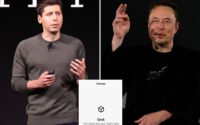‘Godfather of AI’ says its threat is ‘more urgent’ than climate change
A prominent artificial intelligence pioneer widely known as the “Godfather of AI” warned Monday that the burgeoning technology is a “more urgent” risk to humanity than the effects of climate change.
Dr. Geoffrey Hinton, 75, flagged the danger days after revealing he quit his part-time role assisting Google’s AI development last month so he could speak more freely about it without disparaging the company’s efforts in the sector.
“I wouldn’t like to devalue climate change. I wouldn’t like to say, ‘You shouldn’t worry about climate change.’ That’s a huge risk too,” Hinton said in an interview with Reuters. “But I think this might end up being more urgent.”
“With climate change, it’s very easy to recommend what you should do: you just stop burning carbon. If you do that, eventually things will be okay. For this it’s not at all clear what you should do.”
Hinton joined a growing chorus of experts, including Elon Musk and Microsoft’s top economist, who have raised alarms about threats that will arise from the unrestrained development of artificial intelligence.
Criticism has escalated following the runaway success of ChatGPT, the chatbot developed by Microsoft-backed OpenAI.
Critics have argued that unregulated AI could fuel the spread of misinformation, cause major losses in the job market and provide bad actors with a new tool to wreak havoc in society.
Earlier this month, Hinton admitted that he now partly regrets his life’s work due to the potential risks. He expressed a fear that advanced AI will eventually grow out of the control of humans as systems develop an ability to create and run their own computer code. He cited the possibility of AI-powered weapon systems as just one scary possibility.

At the same time, the computer scientist said he does not support a call from Musk and more than 1,000 other experts in March to implement a six-month pause in advanced AI development so that proper guidelines could be put in place.
Hinton described the concept of a pause as “utterly unrealistic.”
“I’m in the camp that thinks this is an existential risk, and it’s close enough that we ought to be working very hard right now, and putting a lot of resources into figuring out what we can do about it,” Hinton said.


Last week, the Biden administration hosted Google CEO Sundar Pichai, OpenAI CEO Sam Altman and various other tech leaders for a forum on AI. The White House said the summit would serve as a “frank and constructive discussion” of how to approach advancements in the technology.
In 2018, Hinton received the Turing Award – the computing world’s equivalent of the Nobel Prize – for work on neural networks that was described as “major breakthroughs in artificial intelligence.”
He is widely credited with laying the groundwork for AI systems that eventually led to the creation of ChatGPT and other leading products.
With Post wires


